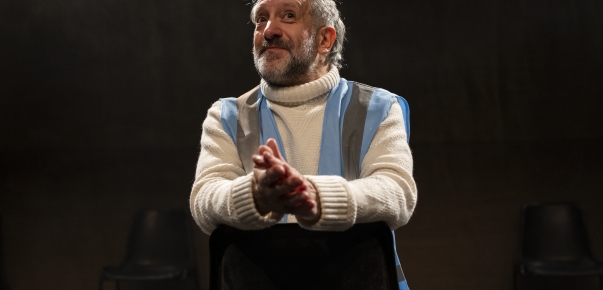Austen Power: A chat with Pride & Prejudice* (*sort of) writer Isobel McArthur
3 May 2023
Pride & Prejudice* (*sort of) returns to BOV this month! We caught up with writer (and original Mr Darcy) Isobel McArthur to let us into the wild, wacky world of her Olivier-Award winning comedy...
Welcome back to Bristol Isobel...
The last time Pride & Prejudice* (*sort of) was here, you all brought the house down! I think we often forget Jane Austen was a funny woman..
The original book is a riot!
For whatever reason, over the last 200 years and all the various adaptations, Austen’s humour has been sidelined in the interest of…I don’t know…something so reverent that it’s become positively solemn. So this adaptation – told by the servants using karaoke – is in the spirit of Austen herself and the way she writes. It’s funny, feminist and front-footed.
How will hard-core Austin fans feel about this version?
From the off, we were all very keen to make something that Austen aficionados could recognise as the book they adore (and I do think that they are in safe hands) – but so, too, are those who might have been put off by a perceived stuffiness associated with works of classic literature such as Pride & Prejudice.

The show won Best Comedy or Entertainment Play at the 2022 Olivier Awards, and recently you won the Emerging Talent Award at the Evening Standard Theatre Awards, what was that feeling like for you?
I think we’re all extremely proud of our collective achievements with this show. It first played at the Tron Theatre in Glasgow in 2018 with a two-week run planned. To be still doing it now is testament to the hard work and talent of the company and proof not only that audiences respond to generous entertainment but also that all-female casts with regional accents don’t detract from historical or literary pieces but, rather, enhance them.

Tell us the rationale behind the all-female cast.
I don’t think anyone living on planet earth needs me to explain why, generally, it is crucial that we see more female leads and hear more female voices in the theatre. But there are many artistic reasons why an all-female cast was so perfect for presenting this story.
Pride & Prejudice is about the plight of five daughters and their mother. Their future hangs in the balance as a direct result of their gender. Without marrying, they will be destitute. Such is the lot of any woman without a man to legally represent her in Regency era England. So – at its very heart - this was always a woman’s story.
It's also a story bound up in the class system of the day so it needed to be told by the servants – it was then especially wonderful to be able to have them also be women and therefore embody the roles of all their employers, including the men, in an act of doubly-transgressive triumph!
What are the physical challenges of the show, given the number of roles everyone plays?
It’s a run-away train for the performers! There are 119 named characters in the original Pride & Prejudice. We have reduced this to an essential 18 in our production – played by just 5 actors. Lightning-fast costume changes are required from the cast throughout. They also play the instruments, sing the songs and perform all the scene changes.
In our adaption, the Pride & Prejudice story is told by the female servants of a Regency era household and these women really did it all. And so, demonstrating the work of the ensemble and the graft of those individuals who are so seldom at the centre of any period story, felt an important gesture to make.
How do you get the balance right between old and contemporary with a production like this?
Story-wise, it isn’t a question of anything feeling old or contemporary per se because the novel remains so relevant. In our show, Pride & Prejudice is set to a pop-karaoke soundtrack. I began compiling a list of songs at the start of the writing process and discovered quickly that all good artists come to the same conclusions about love. When Jarvis Cocker tries to define it – he does so in the same terms as Austen. It’s no coincidence. Some things just endure.
Aesthetically, however, when it comes to old and new - it’s a free-for-all! The design, music and tone borrow from a full two hundred years of romantic history so expect things to remind you, your folks and your grannie of when you first fell for someone.

Have you ever received a piece of advice that has stuck with you, or is there a piece of advice that you’d like to pass on?
If there’s one over-arching thing that keeps me right, I suppose it’s to continue to ‘put myself’ in the audience. It might sound so obvious but, keep asking as you write or make – does it still make sense now? Is it still exciting now? If I were sat there – what would I understand at this point?
Satisfying what an audience needs often means including things which feel blunt or clunky or obvious, having to work much harder – or just doing away with parts of your work you are fond of. But if the audience aren’t looked after, the whole endeavour is futile.
Pride & Prejudice* (*sort of) runs at Bristol Old Vic from 9-20 May. Find out more


